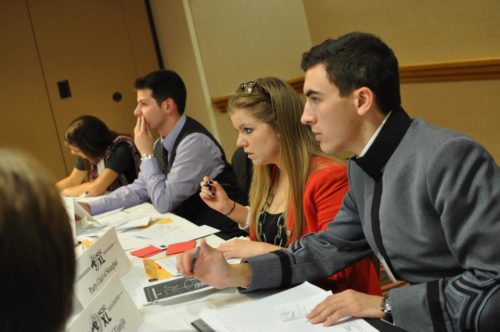
College Model UN can feature crisis committees and well-researched delegates
The college Model UN season is about to begin! For many of the college freshmen, you’re probably excited to get back into MUN. Some of you were among the best delegates in high school and want to make a name for yourselves on the college circuit. Others of you may have been big fishes in small ponds and are excited to finally participate at a higher-caliber MUN. And others of you may love MUN and are simply excited for it to continue on in college, both in committee and out of committee. There are also a good number of you who’ve never done MUN before and will be going into your first conference — you’re probably reading this website for the first time — so welcome!!
Regardless of your MUN background, you’ll likely need to make a transition. Just like with any academic competition or any sport, the level of competition and the overall experience of the activity changes as you move from the high school level to the collegiate level. With that in mind, here are five mistakes to avoid at your first college MUN conference:
1. Not Doing Your Research
A lot of high school delegates were successful in high school Model UN by “BS-ing” — essentially making things up instead of doing real research. You could still try that in college, but I would suggest being careful. College delegates in general are smarter, more internationally diverse, and more well versed in international issues if they’re voluntarily doing MUN at this level. And the most experienced delegates in the room are experts on their topic, especially if it’s related to their major, senior thesis, or past internships. Don’t try making up Kazakh military policy when you have a West Point cadet and someone actually from Kazakhstan in the room.
2. Talking Really Loud
A lot of high school delegates appeared to be the confident one in the room by talking really loud — they’re the ones with a commanding speech and the ones who talk over everyone else during unmoderated caucus. But in college, that just looks like you’re trying too hard. There are lot more confident and polished speakers in the room, and only having a loud volume actually doesn’t come off as being a dynamic speaker. Committee sizes are also smaller than high school ones on average, so adjust your volume accordingly.
3. Playing by the Wrong Rules of Procedure
It’s highly possible that your first college conference uses different rules of procedure than what you were used to in high school. Besides regional differences in rules of procedure or terminology or styles, the two most common major transitions are:
- If you have been doing General Assembly-style committees your entire life but get assigned to a crisis, then throw your old ROP strategies away. The speakers list and being the main sponsor of a resolution are no longer valuable. Strategic motions for moderated caucus and working the crisis room via directives are your new friends now.
- If you did THIMUN procedure in high school, then you basically have to learn a new dialect of Model UN entirely. If you’re doing a university GA, then think of it like speakers list, ten-minute lobbying, five-minute rapid open debate, and repeat among those three until presentation of resolution. If you’re doing crisis, then you’re basically learning MUN from scratch.
4. Having Many Poor Ideas Instead of One Great Idea
In high school, it was feasible to produce super-long draft resolutions because delegates usually had not researched your ideas and would let them be included so that they could be diplomatic or frankly because they just sounded good (or you BS’ed so well that you made it sound good or realistic). This is usually not the case in college MUN. The bloc leaders are much stronger negotiators who would retain only the best clauses or are willing to sacrifice poor clauses during forced mergers. Those who are experts on the topics or have a strong understanding of international relations theory will filter also out the unrealistic ideas — or “steal” them by improving them. The resolutions in university on average are much shorter, so it’s better to ensure that you have one great idea that could give you main sponsorship over a resolution instead of many poor ideas that add length but not authority over a resolution.
5. Not Communicating Your Social Limits
The college MUN social scene will be a lot different than the high school MUN social scene — it’s going to reflect the mainstream college social culture of the region you’re in. On the positive side, it’s actually great to build relationships with delegates from other schools, and the college MUN circuit is very tight-knit. But everyone has different social preferences and limits. Do what’s right for you and communicate your boundaries accordingly. Find the responsible veteran delegate who’ll introduce you to the social scene in the way that you feel comfortable with. Ultimately, the experiences will be different but the old adage from high school should still stay the same: M-U-N is F-U-N.
**
Good luck and have fun to all the delegates starting or returning on the college Model UN circuit this season!


